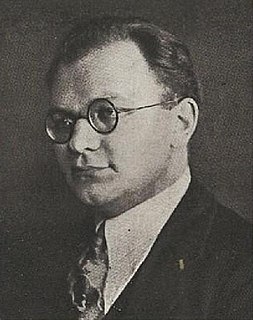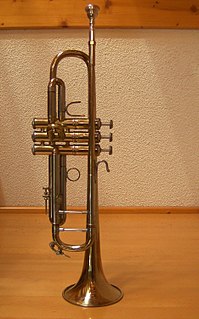Related Research Articles

A musical ensemble, also known as a music group or musical group, is a group of people who perform instrumental or vocal music, with the ensemble typically known by a distinct name. Some music ensembles consist solely of instruments, such as the jazz quartet or the orchestra. Other music ensembles consist solely of singers, such as choirs and doo wop groups. In both popular music and classical music, there are ensembles in which both instrumentalists and singers perform, such as the rock band or the Baroque chamber group for basso continuo and one or more singers. In classical music, trios or quartets either blend the sounds of musical instrument families or group together instruments from the same instrument family, such as string ensembles or wind ensembles. Some ensembles blend the sounds of a variety of instrument families, such as the orchestra, which uses a string section, brass instruments, woodwinds and percussion instruments, or the concert band, which uses brass, woodwinds and percussion.

Timothy "Tim" George Hodgkinson is an English experimental music composer and performer, principally on reeds, lap steel guitar, and keyboards. He first became known as one of the core members of the British avant-rock group Henry Cow, which he formed with Fred Frith in 1968. After the demise of Henry Cow, he participated in numerous bands and projects, eventually concentrating on composing contemporary music and performing as an improviser.

The Octet in F major, D. 803 was composed by Franz Schubert in March 1824. It was commissioned by the renowned clarinetist Ferdinand Troyer and came from the same period as two of Schubert's other major chamber works, the 'Rosamunde' and 'Death and the Maiden' string quartets.

In music, an octet is a musical ensemble consisting of eight instruments or voices, or a musical composition written for such an ensemble.
In music, a nonet is a composition which requires nine musicians for a performance, or a musical group that consists of nine people. The standard nonet scoring is for wind quintet, violin, viola, cello, and contrabass, though other combinations are also found.
John E. Ferritto was an American composer, conductor, and music professor.

Jaroslav Řídký was a Czech composer, conductor, harpist, and music teacher.
Jan Zdeněk Bartoš was a Czech composer.
The Melos Ensemble is a group of musicians who started in 1950 in London to play chamber music in mixed instrumentation of string instruments, wind instruments and others. The ensemble's reputation for excellence has encouraged composers to write music exploring these resources. Benjamin Britten composed the chamber music for his War Requiem for the Melos Ensemble and conducted the group in the first performance in Coventry.
William Jay Sydeman is an American composer. Born in New York, he studied at the Mannes School of Music, where he later taught composition (1960–1970). Winning early acclaim for his avant-garde music, he felt trapped by the prevailing orthodoxies and moved to California in 1970, beginning a period of wandering during which he also studied Buddhism and Anthroposophy. He joined ASCAP in 1975. In 1981 he settled in Sacramento and resumed composition at his former prolific rate, having newly embraced a neotonal musical language. He currently resides in Mendocino.
In music, a decet—sometimes dectet, decimette, or even tentet—is a composition which requires ten musicians for a performance, or a musical group that consists of ten people. The corresponding German word is Dezett, the French is dixtuor. Unlike some other musical ensembles such as the string quartet, there is no established or standard set of instruments in a decet.

The trumpet repertoire consists of solo literature and orchestral or, more commonly, band parts written for the trumpet. Tracings its origins to 1500 BC, the trumpet is a musical instrument with the highest register in the brass family.
Living Toys, Op. 9, is a composition for chamber ensemble by the English composer Thomas Adès. It was written in 1993 as a part of his MPhil portfolio in Composition at Cambridge University and premiered at the Barbican Hall in London under Oliver Knussen.
Jan Tausinger was a Romania-born ethnic Czech violist, conductor and composer.
Paul Angerer was an Austrian violist, conductor, composer and radio presenter.
In music, a duodecet—sometimes duodectet, or duodecimette—is a composition which requires twelve musicians for a performance, or a musical group that consists of twelve people. In jazz, such a group of twelve players is sometimes called a "twelvetet". The corresponding German word is duodezett. The French equivalent form, douzetuor, is virtually unknown. Unlike some other musical ensembles such as the string quartet, there is no established or standard set of instruments in a duodecet.
Richard David Carrick is an American composer, pianist and conductor. He was a Guggenheim Fellow in Music Composition for 2015-16 while living in Kigali, Rwanda. His compositions are influenced by diverse sources including traditional Korean Gugak music, the flow concept of Mihaly Csikszentmihalyi, Gnawa Music of Morocco, Jazz, experimental music, concepts of infinity, the works of Italo Calvino and Ludwig Wittgenstein, and his work as improviser.
Pamela Harrison was an English pianist, music teacher and composer.
Charles Villiers Stanford's Serenade in F major, Op. 95 is a composition for a chamber ensemble of nine soloists, composed in 1905.
References
- 1 2 "Capricorn". Hyperion Records. Archived from the original on 22 August 2019. Retrieved 23 August 2019.
- ↑ Cummings, David M. (2000). International Who's who in Music and Musicians' Directory: (in the Classical and Light Classical Fields). Psychology Press. p. 368. ISBN 0948875534.
- ↑ Morrison, Bryce (17 January 1974). "London debuts". The Times. Reviews. (58990). London, England. p. 7.
- ↑ Walsh, Stephen (20 May 1984). "Puzzling Pole". The Observer. London, England. p. 20. Retrieved 22 August 2019.
- ↑ Bowen, Meirion (13 December 1982). "Capricorn". The Guardian. London, England. p. 11. Retrieved 23 August 2019.
- ↑ "Prom 23, 7 August 1991". BBC. Retrieved 12 December 2018.
- ↑ Cole, Hugo (25 January 1984). "Capricorn 10th birthday". The Guardian. London, England. p. 11. Retrieved 22 August 2019.
- ↑ Pettitt, Stephen (25 January 1984). "Concerts: Anniversary classics: Capricorn/Friend: Queen Elizabeth Hall". The Times. London, England. p. 9.
- ↑ Murray, David (3 May 1994). "Twenty years of Capricorn". Financial Times. p. 13.
- ↑ Bowen, Meirion (25 April 1991). "Capricorn". The Guardian. London, England. p. 28. Retrieved 22 August 2019.
- ↑ "Capricorn Ensemble". Dacapo. Archived from the original on 22 August 2019. Retrieved 23 August 2019.
- ↑ Campbell, Margaret (12 May 1997). "Obituary: Timothy Mason". The Independent. Archived from the original on 12 December 2018. Retrieved 10 September 2018.
- ↑ Capricorn: Glinka Grand Sextet, Rimsky-Korsakov Piano and Wind Quintet (Media notes). London: Hyperion Records. 1984. p. 3. CDA66163.
- ↑ Capricorn: Parry & Stanford Nonets (Media notes). London: Hyperion Records. 1987. p. 2. CDH55061.
- ↑ Capricorn: Hummel Septets (Media notes). London: Hyperion Records. 1989. p. 3. CDA66396.
- ↑ The Music of Poul Ruders (Media notes). London: Bridge Records. 1992. p. 1. 9037.
- ↑ "Capricorn Ensemble". MusicBrainz. Archived from the original on 22 August 2019. Retrieved 22 August 2019.